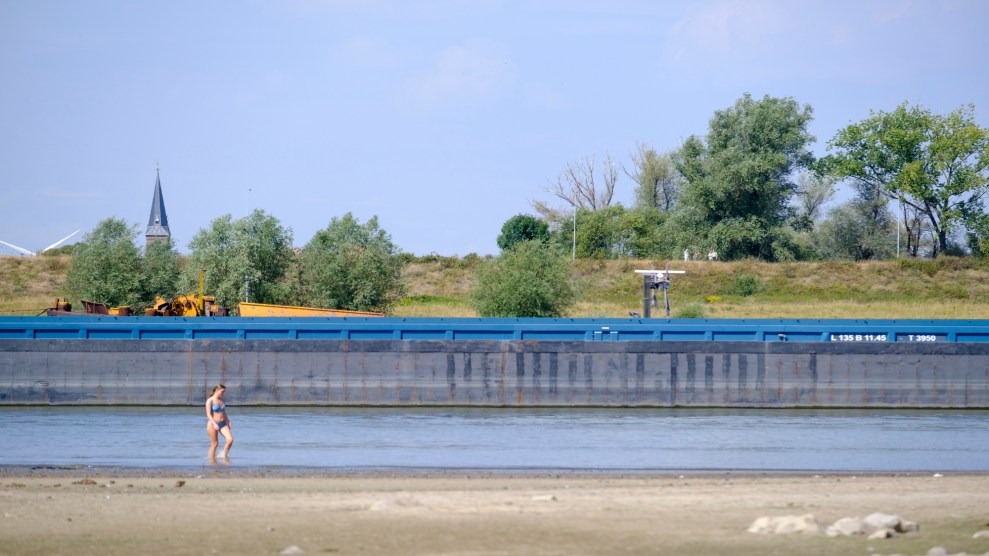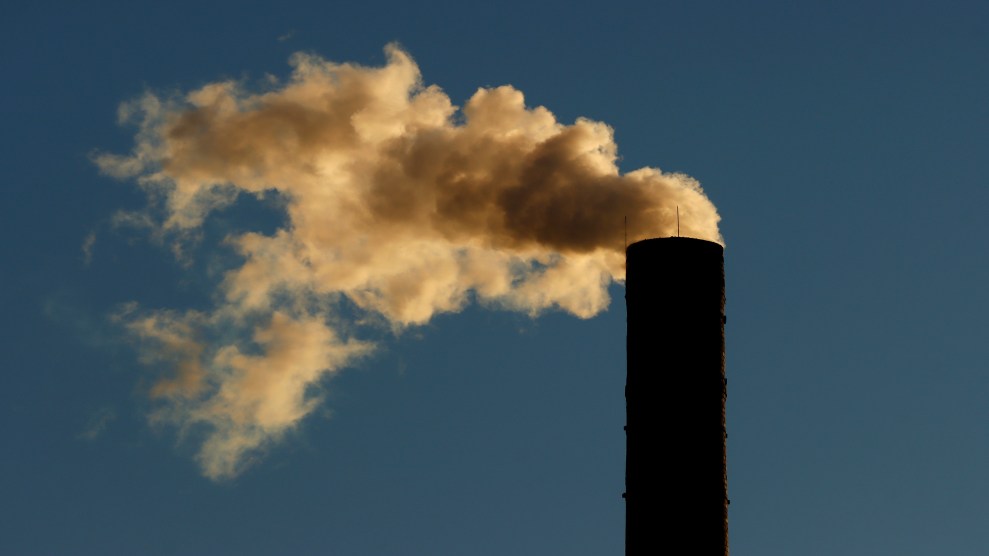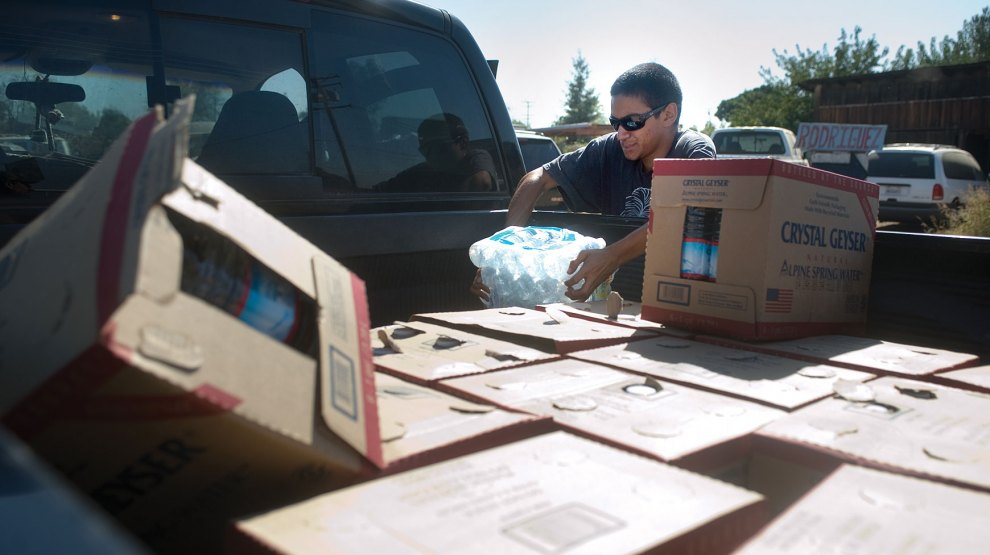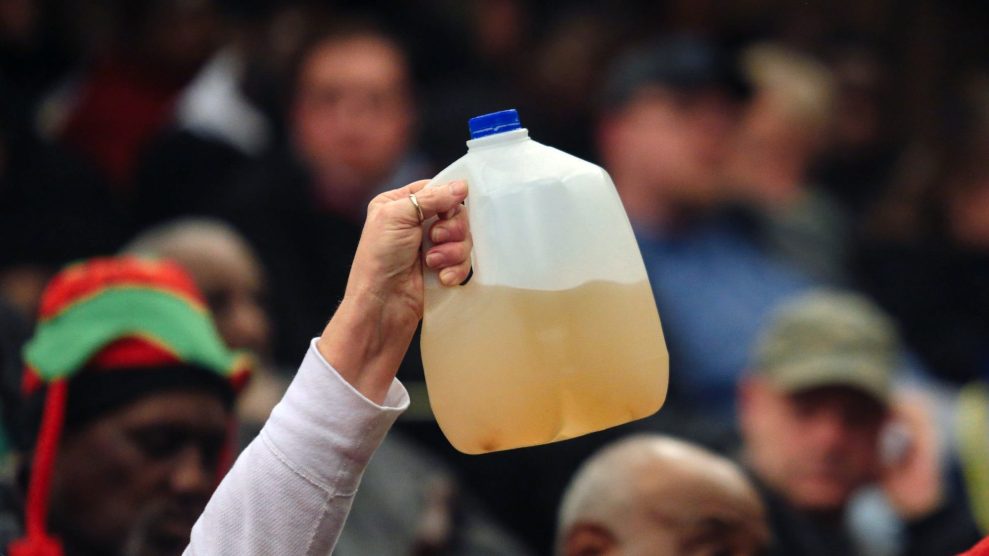
The main distributary branch of the river Rhine in Ooyse Schependom, Netherlands. Europe's streams and rivers are reaching historic lows.Thierry Monasse / Getty
This story was originally published by the Guardian and is reproduced here as part of the Climate Desk collaboration.
The world is facing an imminent water crisis, with demand expected to outstrip the supply of fresh water by 40 percent by the end of this decade, experts have said on the eve of a crucial UN water summit.
Governments must urgently stop subsidizing the extraction and overuse of water through misdirected agricultural subsidies, and industries from mining to manufacturing must be made to overhaul their wasteful practices, according to a landmark report on the economics of water.
Nations must start to manage water as a global common good, because most countries are highly dependent on their neighbors for water supplies, and overuse, pollution, and the climate crisis threaten water supplies globally, the report’s authors say.
Johan Rockstrom, the director of the Potsdam Institute for Climate Impact Research and co-chair of the Global Commission on the Economics of Water, and a lead author of the report, told the Guardian the world’s neglect of water resources was leading to disaster. “The scientific evidence is that we have a water crisis. We are misusing water, polluting water, and changing the whole global hydrological cycle, through what we are doing to the climate. It’s a triple crisis.”
Rockstrom’s fellow Global Commission on the Economics of Water co-chair Mariana Mazzucato, a professor at University College London and also a lead author of the report, added: “We need a much more proactive, and ambitious, common good approach. We have to put justice and equity at the centre of this, it’s not just a technological or finance problem.”
The report marks the first time the global water system has been scrutinized comprehensively and its value to countries—and the risks to their prosperity if water is neglected—laid out in clear terms. Like with the Stern review of the economics of the climate crisis in 2006 and the Dasgupta review of the economics of biodiversity in 2021, the report authors hope to highlight the crisis in a way that policymakers and economists can recognize.
Many governments still do not realize how interdependent they are when it comes to water, according to Rockstrom. Most countries depend for about half of their water supply on the evaporation of water from neighboring countries—known as “green” water because it is held in soils and delivered from transpiration in forests and other ecosystems, when plants take up water from the soil and release vapor into the air from their leaves.
The report sets out seven key recommendations, including reshaping the global governance of water resources, scaling up investment in water management through public-private partnerships, pricing water properly and establishing “just water partnerships” to raise finance for water projects in developing and middle-income countries.
More than $700 billion of subsidies globally go to agriculture and water each year and these often fuel excessive water consumption. Water leakage must also be urgently addressed, the report found, and restoring freshwater systems such as wetlands should be another priority.
Water is fundamental to the climate crisis and the global food crisis. “There will be no agricultural revolution unless we fix water,” said Rockstrom. “Behind all these challenges we are facing, there’s always water, and we never talk about water.”
Many of the ways in which water is used are inefficient and in need of change, with Rockstrom pointing to developed countries’ sewage systems. “It’s quite remarkable that we use safe, fresh water to carry excreta, urine, nitrogen, phosphorus—and then need to have inefficient wastewater treatment plants that leak 30 percent of all the nutrients into downstream aquatic ecosystems and destroy them and cause dead zones. We’re really cheating ourselves in terms of this linear, waterborne modern system of dealing with waste. There are massive innovations required.”
The UN water summit, led by the governments of the Netherlands and Tajikistan, will take place in New York on 22 March. World leaders are invited but only a few are expected to attend, with most countries to be represented by ministers or high-ranking officials. It will mark the first time in more than four decades the UN has met to discuss water, with previous attempts stymied by governments reluctant to countenance any form of international governance of the resource.
Henk Ovink, a special envoy for international water affairs for the Netherlands, told the Guardian the conference was crucial. “If we are to have a hope of solving our climate crisis, our biodiversity crisis and other global challenges on food, energy and health, we need to radically change our approach in how we value and manage water,” he said. “[This] is the best opportunity we have to put water at the centre of global action to ensure people, crops and the environment continue to have the water they need.”
Seven calls to action on water
- Manage the global water cycle as a global common good, to be protected collectively and in our shared interests.
- Ensure safe and adequate water for every vulnerable group, and work with industry to scale up investment in water.
- Stop underpricing water. Proper pricing and targeted support for the poor will enable water to be used more efficiently, more equitably, and more sustainably
- Reduce the more than $700 billion of subsidies in agriculture and water each year, which often fuel excessive water consumption, and reduce leakage in water systems.
- Establish “just water partnerships” which can mobilize finance for low- and middle-income countries.
- Take urgent action this decade on issues such as restoring wetlands and depleted groundwater resources;, recycling the water used in industry; moving to precision agriculture that uses water more efficiently; and having companies report on their “water footprint.”
- Reform the governance of water at an international level, and including water in trade agreements. Governance must also take into account women, farmers, indigenous people and others in the frontline of water conservation.
















